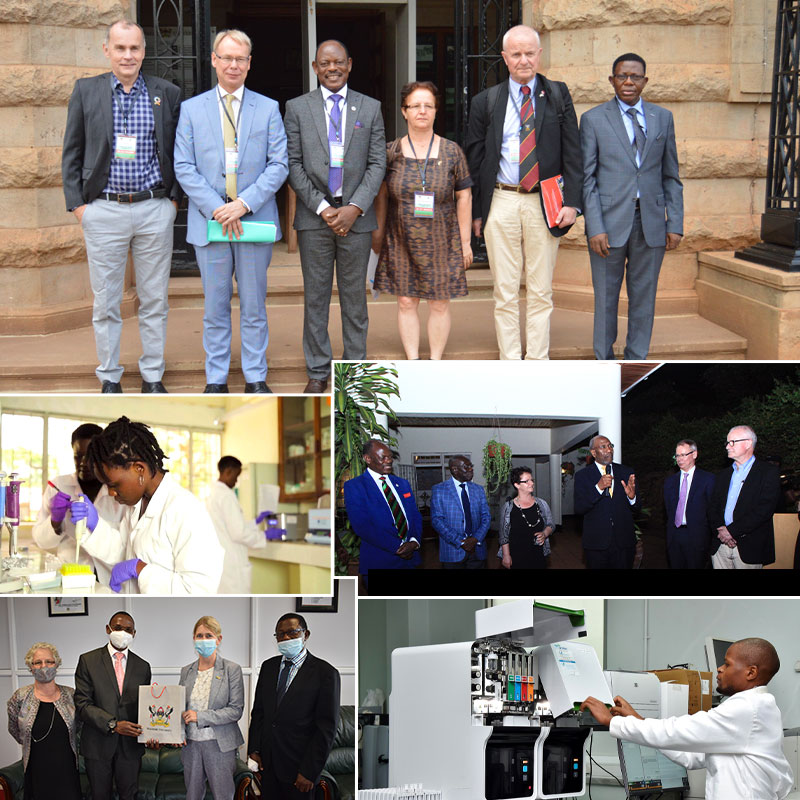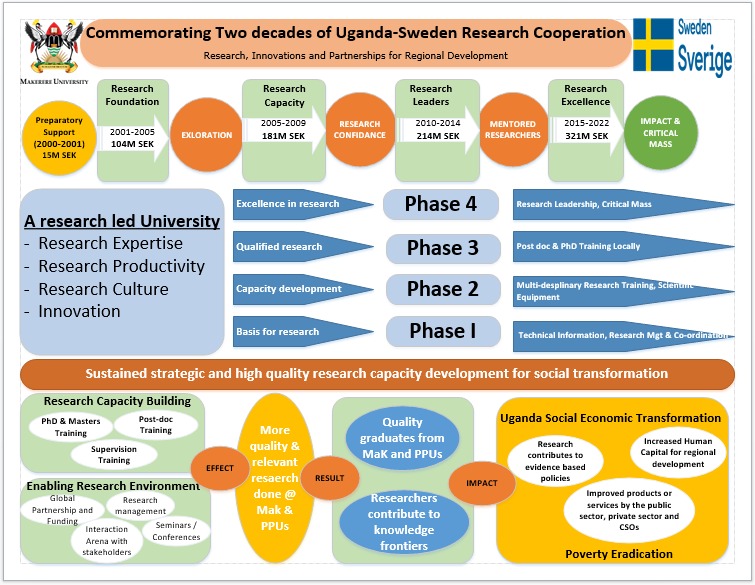Welcome to International Research Conference on Multidisciplinary Research and Transformation in Uganda
Overview

The Swedish research cooperation with Uganda was initiated in 2000 and consisted of institutional research capacity strengthening. To-date, there has been four consecutive research agreement periods with a total support of SEK 813M (USD 116M). The main objective of the bilateral research cooperation has been to enhance capacity of public higher education institutions to conduct and sustain strategic and high quality research that will contribute to the development needs of Uganda and beyond through building a critical mass of independent researchers.
The programme was built around international research collaboration, principally with Swedish universities. The programme aimed to support MaK towards its goal of becoming a vibrant, internationally competitive research university. From 2010 four (4) other public universities entered the cooperation: Kyambogo, Busitema, Gulu and Mbarara University of Science and Technology, and the support to those universities has been channeled through MaK.
These five Collaborating Uganda public Universities have enjoyed and continue to benefit from the generosity of the Royal Government of Sweden in the areas of human resources capacity building, research, library services/ICT; scientific and field Laboratories, academic quality assurance, gender mainstreaming and to the institutional reform processes.
Following the complex and unprecedented challenges brought about by the Covid-19 pandemic, excellence in research and innovation has never been more vital. Makerere University and its partner public Universities are uniquely positioned to play an integral role in the economic and social recovery post-pandemic at a national, regional, and international level, and crucial to this are strengths in research, development, and innovation. During the conference, the researchers will share their findings from research studies with a view to keeping the public, researchers and policy makers informed of current research activities relevant to the realization of the NDP II & III, Uganda Vision 2040, African Charter 2063, and SDGs 2030.
It is indeed a celebration of strong Uganda-Sweden partnership that covers a period spanning over 20-years of institutional research support and capacity building initiatives.
Conference Aim:
The Conference aims to bring together academic scientists, researchers and research scholars to exchange and share their experiences and research results on all aspects of research and innovation. It also provides a premier interdisciplinary platform for researchers, practitioners, and educators to present and discuss the most recent innovations, trends, and concerns as well as practical challenges encountered and solutions adopted in the fields of Research and Innovation.
The objectives of the conference are:
- To provide an inclusive platform fostering an active community of researchers collaborating on issues of social significance and societal concern
- To provide an open and accessible mechanism for sharing creative contributions to the research agenda across various subject matter and discipline areas
- To advance the principles and practices of Responsible Research and Innovations in support of researchers at all stages of their research journey

THEME
Two Decades of Swedish Support to Societal Transformation Through Research, Innovations and Partnerships
SUB-THEMES
- Natural Resource Utilisation, Energy and Environmental Sustainability
- Agriculture, Food Security, Safety and Value Addition
- One health, Health Promotion and Health Systems
- Culture, Socio-economic Development, Governance, Conflict and Social justice
- Climate Change and Disaster Management
- Advances in Education, Science and Technology
- Gender And Women’s Empowerment
- ICT, Library, Research Environment and Knowledge Translation
Members of the Organising Committee
General Committee
|
SN |
NAME |
Responsibility |
Institution |
|
1 |
Buyinza Mukadasi |
Chairperson, Organizing Committee |
Makerere University |
|
2 |
Nestor Mugabe |
General duties |
Makerere University |
|
3 |
Gity Bahravan |
Technical Advisor |
Embassy of Sweden, Kampala |
|
4 |
Leif Abrahamsson |
Technical Advisor |
ISP, Uppsala University, Sweden |
|
5 |
Claudia Hanson |
Technical advisor |
KarolinskaInstitutet |
|
6 |
Ulrica Ouline |
Technical Advisor |
ISP, Uppsala University, Sweden |
Scientific Sub-Committee
|
SN |
NAME |
INSTITUTION |
|
1 |
Oyana Tonny ( Chairperson) |
Makerere University |
|
2 |
Nabalegwa Muhamud |
Kyambogo University, Uganda |
|
4 |
Benedict Oyo |
Gulu University, Uganda |
|
5 |
Samson Rwahweire |
Busitema University, Uganda |
|
6 |
Gilbert Maiga |
Makerere University |
|
7 |
Robert Wamala |
Makerere University |
|
8 |
Yazidhi Bamutaze |
Makerere University |
|
9 |
Juliet Kiguli |
Makerere University |
|
10 |
Consolata Kabonesa |
Makerere University |
|
12 |
Alice Turinawe |
Makerere University |
Secretariat
|
SN |
NAME |
INSTITUTION |
|
1 |
Samuel Siminyu |
Makerere University |
|
2 |
Piriyo Dickens |
Makerere University |
|
3 |
Isaac Mutenyo |
Makerere University |
Logistics Sub-Committee
|
SN |
NAME |
INSTITUTION |
|
1 |
John Mango (Chairperson) |
Makerere University |
|
2 |
Lydia Mazzi |
Makerere University |
|
3 |
Andrew Malagala |
Makerere University |
|
4 |
Paul Kiggundu |
Makerere University |
|
5 |
Prossy Nakayiki |
Makerere University |
Publicity Sub-Committee
|
SN |
NAME |
INSTITUTION |
|
1 |
Ritah Namisango (Chairperson) |
Makerere University |
|
2 |
Godfrey Mayende |
Makerere University |
|
3 |
Sam Siminyu |
Makerere University |
|
4 |
Betty Kyakuwa |
Makerere University |
|
5 |
Mark Wamai |
Makerere University |
|
6 |
Elias Tuhereze |
Makerere University |
|
7 |
Dennis Wamala |
Makerere University |
|
8 |
Arthur Opio |
Makerere University |
In addition to the overall Makerere University organizing committee, there are three sub-committees, namely:
- Scientific Committee, Chaired by Prof. Tonny Oyana
- Logistics and Finance Committee, Chaired by Prof. John Mango and;
- Public Relations Committee, Chaired by Ms. Ritah Namisango, SPRO.

This 2-day event will provide delegates with practical ideas and opportunities to discuss how to optimise the impact of research and innovation through effective strategy, partnerships, regulation, communication, and engagement.
Central Theme: “Two Decades of Swedish Support to Societal transformation through research, innovations and partnerships”
Within this broad thematic orientation, Makerere University Organizing Committee through its Scientific Committee encourages papers adopting empirical, experimental and theoretical perspectives, from researchers at all stages of the research process.
The Conference will be organized around a competitive call for papers addressing each of the following seven Conference Sub-themes:
- Natural Resource Utilisation, Energy and Environmental Sustainability
- Agriculture, Food Security, Safety and Value Addition
- One Health, Health Promotion and Health Systems
- Culture, Socio-economic Development, Governance, Conflict and Social Justice
- Climate Change and Disaster Management
- Advances in education, science and technology
- Gender and Women’s empowerment,
- ICT, Library, Research Environment and Knowledge Translation.
Key dates:
- Conference Code: DRGT2022
- Call for Abstracts: January 28 2022
- Submission Deadline: March 18 2022
- Notification of Acceptance: March 31 2022
- Final date of Online submission of Revised Abstracts: April 14 2022
- Registration Deadline: April 29 2022
- Conference Date: From May 9th to May 10th 2022
Venue: Munyonyo Speke Resort and Conference Centre
Mode of Participation
The Scientific Committee will use a hybrid mix of limited in-person participants and virtual participants. The Committee will provide a great experience for all participants through the use of online platform meeting tools such as AppinConf, Zoom, YouTube, and popular Social Media channels. The Conference website will provide up-to-date und comprehensive information on each individual session: hosts, chairs, speakers (keynote and others), panelists, detailed research paper abstracts, and links for digital participation.
Guidelines for Submission of Abstracts and Research Papers
- The abstract should not exceed 400 words and should be followed by 4-6 keywords.
- Each abstract should consist of a research title, an abstract of 250 words (maximum), a list of author(s) and the institution of affiliation of author(s). A standard abstract is expected to have the following components: a background statement, hypothesis, knowledge gap or an objective; data and methods statement; results with main findings; discussion/policy implication statement, and future direction statement.
- The plagiarism report and declaration must be attached in the annexure.
- The cover page of the manuscript must contain the Title of the Paper, Author’s Name, Affiliation, Email Address. The paper should be typed in Font Style – Times New Roman, Font Size – 12, Line and Paragraph Spacing – 1.5 and 2.
- The total length of a full research paper must not exceed 3500 words or 12 pages including Graphs, Tables, and Appendices. All author(s) of a research paper are expected to submit a camera-ready manuscript with proper formatting and style consisting of an Introduction, Methods and Materials, Results, Discussion, Policy Implications, Conclusion, and References.
- The cover page should not be a part of the paper so as to facilitate a blind peer review of the paper.
- Conference language: English
Details for Abstract and Poster Submission
Submit your abstract and paper via web in MS-Word format to the email: conference@rgt.mak.ac.ug
For further enquires please send an email to abstracts.drgt2022@appinconf.com. Limited Funding Opportunities will be provided to Young Scholars (Graduate Students) from the E.A-region to participate in the conference.